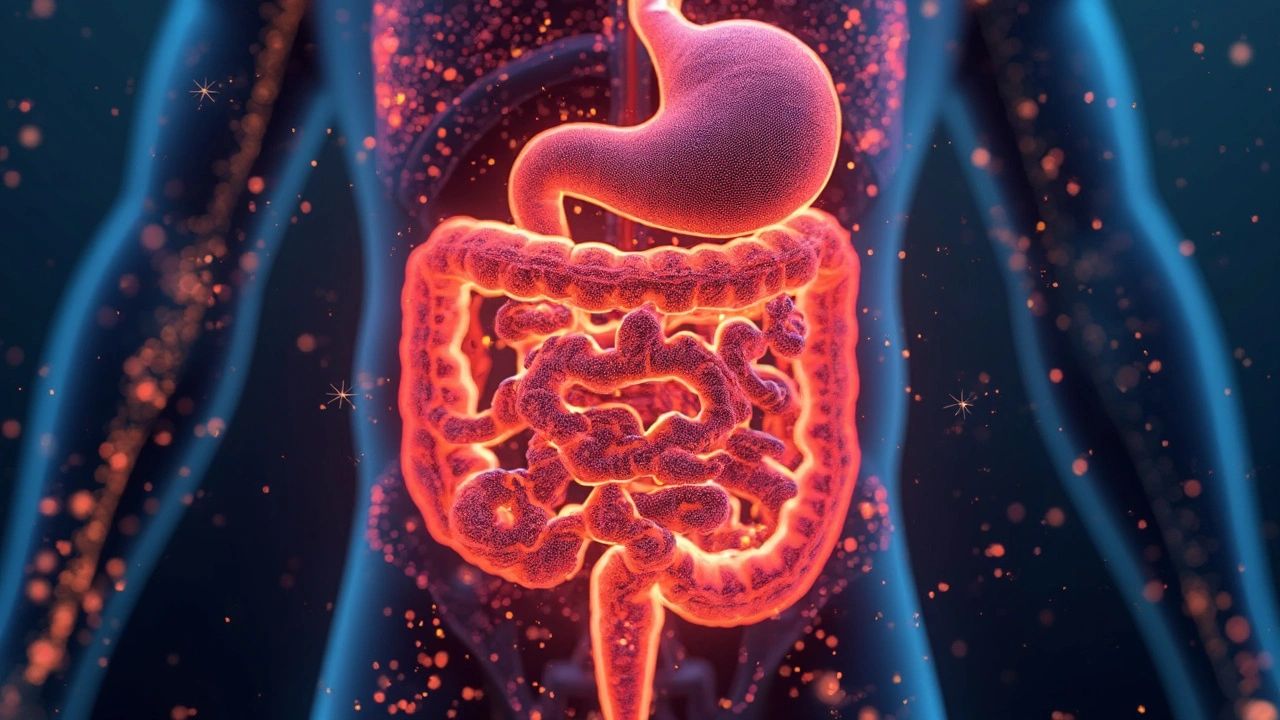Have you ever felt bloated after a healthy meal and wondered what's going on? Maybe it's not the food, but your enzymes playing tricks on you. Enzymes are the unsung heroes that help digest our meals. When they're lacking, your stomach might feel like it's throwing a protest party, complete with gas and bloating.
But how do you know if enzymes are the culprits? Common signs are pretty relatable—think excessive burping or struggling with frequent stomachaches. Some people even notice unexplained weight loss or fatigue because inadequate enzymes mean you're not getting the most out of your food.
It's easy to overlook these issues and chalk them up to stress or poor eating habits, but understanding and recognizing enzyme deficiency is crucial. Making a few changes, like adjusting your diet, can sometimes be all it takes to get those enzymes back on track. So, let's get into the nitty-gritty of how enzymes work and what happens when there's a shortage.
- What Are Enzymes?
- Common Symptoms of Enzyme Deficiency
- Why Enzymes Matter
- Enzyme Deficiency Triggers
- Foods That Support Enzyme Health
- When to Seek Professional Help
What Are Enzymes?
Ever wondered what makes our bodies function so smoothly, at least most of the time? Meet enzymes—our body's natural biochemists. They might sound like something out of a science book, but they are really the magic workers behind how we digest food, speed up chemical reactions, and keep things running like clockwork.
So, what exactly are they? Enzymes are proteins, super tiny yet powerful, that help break down food so our bodies can absorb it. Think of them as the internal chefs that chop and sauté your meals into more manageable pieces. Without these helpers, digestion would be slow, if not impossible.
Enzymes have specific roles and are specialized. For example, amylase breaks down carbohydrates, lipase takes care of fats, and protease manages proteins. It's like a designated hitter in baseball! This specialization makes them efficient at what they do.
Types of Digestive Enzymes
Let's break it down further:
- Amylase: Found in saliva and the pancreas, amylase tackles carbs like bread and pasta.
- Protease: It lives in your stomach and small intestine, handling proteins found in meat and beans.
- Lipase: This one comes from your pancreas, breaking down fats in foods like butter and oils.
Why They Matter
Without the right enzymes, our bodies can't properly break down food. That means nutrients aren't absorbed efficiently, which can lead to a host of issues, from bloating to malnutrition. Basically, they ensure we get the most nutritional bang for our buck.
Fun fact: our bodies produce over 3,000 different enzymes, each with its own unique function! It's a pretty impressive feat if you ask me.
Whether you're munching on a slice of pizza or enjoying a salad, enzymes are the backstage pass that lets your body enjoy the show. So next time you eat, give a little nod to these hidden heroes.
Common Symptoms of Enzyme Deficiency
When your body doesn't produce enough enzymes, it can stir up quite the digestive drama. The signs aren't always obvious, but if you're familiar with them, it can make life's digestive puzzles a lot easier to solve. Here are some telltale signs to look out for:
Digestive Disturbances
If you often feel bloated, experience excessive gas, or have a weird sense of fullness that lingers long after eating, you might be experiencing symptoms of lack of enzymes. Your body struggles to break down food properly, leaving you feeling less than stellar.
Changes in Stools
Sound gross, but it’s important! Stools can tell you a lot about what's going on inside. Loose stools or diarrhea can be signs that your food isn't being digested properly. On the flip side, constipation might also hint at enzyme trouble.
Unexpected Weight Loss
Without enough enzymes, your body might not absorb nutrients effectively from food, which can lead to unexplained weight loss. It might sound like a dream diet plan, but it's definitely not healthy.
Chronic Fatigue
Feeling tired all the time and can't explain why? It could be enzyme deficiency. Without proper nutrient absorption, your energy levels can take a serious hit.
| Symptom | Possible Cause |
|---|---|
| Bloating & Gas | Improper food breakdown |
| Loose Stools | Incomplete digestion |
| Fatigue | Poor nutrient absorption |
These symptoms can be easily mistaken for other conditions, so it’s a good idea to keep a food diary and track when you experience discomfort. If these symptoms sound all too familiar, it might be time to look into enzyme support options and possibly consult a healthcare professional.
Why Enzymes Matter
You might not realize it, but enzymes are a big deal when it comes to keeping our bodies running smooth. Imagine trying to get energy without breaking down the food first. That's what enzymes do—they break food down into nutrients your body can use.
Think about it like this: without the right enzymes, all those nutritious meals could just sit in your stomach like a brick. Not exactly what you're aiming for, right? Especially when you're trying to make the most out of your diet. According to Linda Lee, MD, a gastroenterologist at Johns Hopkins, “Enzymes are crucial players in our body's game of maintaining healthy digestion and energy levels.”
Digestive Process
Here's the scoop: enzymes speed up your body's chemical reactions. You eat, enzymes get to work breaking down proteins, carbs, and fats. Without these tiny powerhouses, you'd struggle with digesting even the simplest meals.
Healthier Absorption
Moreover, enzyme deficiency can mess with more than just your tummy. It restricts nutrient absorption, meaning you miss out on vital vitamins and minerals. Over time, this can lead to deficiencies, leaving you sluggish and fatigued. It's pretty much like buying a gourmet burger and then forgetting to eat the patty.
More Than Just Digestion
Enzymes don’t only hang out in your gut; they help with other bodily tasks, ranging from repairing tissues to breaking down toxins. It’s like having your own personal clean-up crew on standby.
| Enzymes | Role |
|---|---|
| Amylase | Breaks down carbohydrates |
| Lipase | Breaks down fats |
| Protease | Breaks down proteins |
So, next time you enjoy a snack, give a nod to those hardworking enzymes. They deserve it! Knowing their importance can help you make better choices if you think your digestion needs a little support. Trust me, your tummy will thank you for paying attention.

Enzyme Deficiency Triggers
So, what exactly triggers a lack of enzymes? It's a combo of lifestyle choices, diet, and sometimes, just life being unfair.
1. Poor Diet Choices
Fast food and processed goodies might give you a quick fix, but they don't help your enzyme levels. These foods often lack the nutrients necessary to maintain a healthy digestive system, leading to possible enzyme deficiency. Try incorporating more fruits, vegetables, and whole grains into your meals.
2. Aging
As we get older, enzyme production naturally declines. It's a part of the aging process that no one tells you about but contributes significantly to enzyme issues. That's why older folks often find certain foods suddenly don't sit well.
3. Stress Isn't Just in Your Mind
When you're stressed, your body can go into fight-or-flight mode, impacting everything from your heart rate to digestion. Prolonged stress disrupts enzyme production, so managing stress through activities like yoga or even just a daily walk can be beneficial.
4. Medical Conditions
Sometimes, certain medical conditions can lead to enzyme deficiency. Conditions like pancreatitis or cystic fibrosis can directly affect enzyme levels. If you've got any chronic health issues, it's worth talking to a healthcare provider about potential enzyme supplements.
5. Alcohol and Smoking
Excessive drinking and smoking do a number on your overall health, including your enzymes. They mess with your gut lining and enzyme output, leading to deficiencies.
Feeling overwhelmed by all these potential triggers? Don't worry. Knowing the culprits means you can adjust and improve your enzyme health with some simple lifestyle tweaks.
Foods That Support Enzyme Health
Eating right can do wonders for giving your body the enzymes it needs. Certain foods are like a special delivery service for these helpful proteins, boosting your digestive health naturally.
Raw Fruits and Vegetables
Ever heard that an apple a day keeps the doctor away? Well, it might also keep your enzyme levels in check. Raw fruits and veggies are loaded with natural enzymes. Pineapple is a top pick because it contains bromelain, an enzyme especially good at breaking down proteins. Papaya is another fruit hero, offering papain, which also aids in protein digestion.
Fermented Foods
No need to fear the funky flavors. Foods like yogurt, kimchi, and sauerkraut not only help your gut with probiotics but also with enzymes that support digestion. These foods often contain a mix of enzymes that promote a healthy gut, which is crucial if you're dealing with an enzyme deficiency.
Sprouted Grains
Whole grains are alright, but sprouted grains are even better. When grains sprout, enzyme levels soar, making it easier for your body to absorb nutrients. Think of it like giving your digestive system a head start.
Nuts and Seeds
Nuts and seeds, especially when raw and unsalted, contain enzymes and are packed with other nutrients. Add them to salads or eat them as snacks to boost those enzyme levels.
How to Incorporate These Foods
Try adding a few enzyme-friendly foods to each meal. Maybe add some papaya to your breakfast smoothie, a handful of nuts for a midday snack, and some sauerkraut with dinner.
By choosing foods wisely, you support your body's natural enzyme production. Your nutrition really can be the magic potion for thriving digestive health. So go ahead, load up your plate with enzyme-boosting goodness and let your body do what it does best.
When to Seek Professional Help
Sometimes you can't crack the case of enzyme deficiency by yourself. It's cool to lean on the pros if you find yourself in a digestive mess and regular fixes aren't doing the trick.
There's a few moments that scream, "Hey, it's time for backup!" First up, if your symptoms persist more than a couple of weeks, you'll probably want to make that call. Constant bloating or discomfort after meals is your body's way of asking for attention.
Digestive Red Flags
- Severe pain: If your stomach discomfort turns into a sharp, unbearable pain, don't shrug it off.
- Significant weight changes: Losing weight without trying, or a reduced appetite, might need checking.
- Malnutrition signs: Things like hair loss, brittle nails, or fatigue could hint your body isn't getting what it needs.
What to Expect on Your Visit
A healthcare pro might run some simple tests to figure out what's going on. This could mean blood tests or other checks to see if a specific type of enzyme is low. And heads up, they might chat about your eating habits and daily routine. Being honest helps them help you.
Your doctor might get into the details, like whether supplements or a change in diet can balance out those enzymes. It's not one-size-fits-all; they'll tailor it to your body and lifestyle.
Remember, teaming up with a pro is all about having the right information on your side. So don't sweat reaching out; they'll help ensure your digestive system works smoothly again.



Abhinanda Mallick
July 17 2025Honestly, it’s astounding how many people overlook enzymes when discussing digestive health. This article nails the point that without proper enzyme function, our bodies literally cannot process food efficiently, leading to all those awful symptoms. Bloating and gas are just the tip of the iceberg here. It’s a catastrophic failure of biological machinery, in my opinion, that deserves more recognition everywhere.
And can we just take a moment to acknowledge the importance of early awareness? I mean, waiting too long to identify enzyme deficiencies could easily spiral into chronic digestive disorders. So yes, I strongly support proactive dietary adjustments and enzyme supplementation where necessary. No more ignorance in health education, folks!
Has anyone tried specific enzyme supplements that actually worked? Sharing concrete experiences might elevate this discussion beyond general advice.
Richard Wieland
July 22 2025This is a well-written overview. Enzyme deficiency is often an under-discussed factor in gut health. The linked symptoms like bloating, gas, and pain are classic indicators but can easily be misattributed to other causes, which complicates diagnosis.
What I find interesting is the practical aspect mentioned — making dietary changes early can mitigate many issues, which aligns with general health principles: prevention is better than cure. I wonder about the role of genetics versus lifestyle in enzyme deficiency though. Thoughts?
rachel mamuad
July 26 2025oof, this article couldn’t come at a better time for me! ive been feeling kinda off after meals and never really thought about enzymes. bloating and gas are def annoying but i chalked them up to what i ate or stress.
i’m curious about what practical steps mean tho? like, do we just eat more certain foods or take supplements? lol sometimes medical jargon is so confusing and overwhelming, but maybe this article breaks things down enough?
anyone else here tried tweaking their diet bc of enzyme issues? pls share ur hacks or what worked for u 🙏
Amanda Anderson
August 1 2025Honestly, I’ve struggled with symptoms like bloating and unexplained stomach pain for years, and it’s fascinating seeing enzyme deficiency brought up as a cause. Most people just assume it’s stress or what we ate, but this makes me wonder if an enzyme imbalance is the real culprit behind so many discomforts.
The article’s emphasis on early recognition is crucial because ignoring these signs only lets the problems compound. I’ve started to explore enzyme-rich foods lately, and the difference is noticeable.
Has anyone found specific foods or natural remedies that helped improve their enzyme levels? Would love to compare notes.
Carys Jones
August 2 2025Okay, can we talk about how often people just mask digestive issues with medication instead of addressing enzyme deficiencies? It’s like putting a band-aid on a bigger problem. This article highlights something so fundamental yet neglected–the root cause of the symptoms.
Honestly, I believe we’re sold short by the health industry with quick fixes instead of educating people on enzyme health. Bloating and stomach pain should never be ignored or stuffed away with antacids. The dietary adjustments suggested might seem simple but could genuinely transform health if people took it seriously.
It’s high time people stop treating symptoms and start treating causes.
Roxanne Porter
August 3 2025I appreciate the clarity of this post about recognizing enzyme deficiencies early. It’s so often missed in the broader discussions about digestive health, yet it plays such a foundational role.
The practical advice mentioned here on dietary adjustments resonates because nutrition really is the first defense and remedy. I would add that consulting a healthcare provider for proper testing is essential—self-diagnosing can sometimes lead people astray.
Does anyone know reliable testing methods or clinics that specialize in enzyme deficiencies? That info could help people take real action beyond just guessing at symptoms.
Jonathan Mbulakey
August 6 2025I find this post thought-provoking in how it outlines basic yet overlooked signs like gas and bloating as signals of a deeper enzyme deficiency issue. It seems intuitive but often our cultural habits dismiss these bodily signals rather than examining them carefully.
What strikes me is how the body’s enzymatic processes, though microscopic, impact quality of life so profoundly. It’s a reminder of the elegance and complexity of human biology.
On a practical level, beyond diet, one might consider the broader lifestyle factors that affect enzyme health — stress levels, sleep quality, and even long-term medication use.
Abby VanSickle
August 10 2025This is a crucial topic that doesn’t get nearly enough attention in public health discussions. Enzyme deficiency can be subtle yet debilitating, especially since many people just accept digestive discomfort as normal.
One concern I have is the accessibility of enzyme testing and supplements across different socio-economic groups. The article’s practical steps are helpful, but what about those without easy access to healthcare or specialty diets?
It’s important that we advocate for wider awareness and affordable solutions, so no one has to suffer in silence because of economic barriers.
chris macdaddy
August 13 2025Great read. I’ve coached many people who struggled with digestive issues for years only to discover enzyme problems later on. It’s humbling how often the root cause is missed initially.
One thing I always stress is lifestyle consistency along with dietary changes. Enzyme production can be impaired by irregular eating times, stress, and lack of physical activity.
For anyone suspecting enzyme deficiency, start tracking your meals and symptoms closely, then try adding enzyme-rich foods or supplements recommended by a healthcare provider. The improvement can be significant.
Moumita Bhaumik
August 14 2025Honestly, I can’t help but feel like the health industry hides enzyme correction methods from common people. These symptoms are so generic yet quite serious if not addressed. It’s probably a conspiracy to keep us coming back for pills rather than fixing the root cause.
The suggestion of dietary adjustments sounds nice, but without transparency about what enzymes exactly and how to replace or boost them, it won’t do much.
Anyone else skeptical about mainstream healthcare conveniently overlooking simple enzyme interventions to maintain their profitability? It’s something to think about.
Duke Gavrilovic
August 16 2025Adding to the conversation, I find the role of enzymes absolutely fascinating as a cultural and biochemical concept. Many traditional diets inherently support enzyme health through fermented foods and fresh ingredients, something modern diets often lack.
The science backs this up, showing how industrialized food processing can degrade enzyme content, which might explain some widespread digestive complaints. Revisiting these old dietary practices could be part of the practical steps people need.
It’s more than just digestion; it’s about reconnecting with food in a way that honors metabolism and body intelligence.